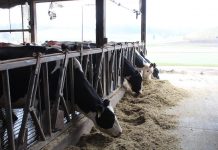By the time you read this column, the reality of the current dairy economics will be hitting you like a brick.
The January Class III price has been announced at $10.78/cwt, a drop of $4.50/cwt from the December 2008 prices. The blend price in Federal Order 33 in January will average about $14/cwt, depending your location.
Unless something excessively drastic happens, something we do not foresee, our blend price in February will drop under $12/cwt. With corn trading around $4/bu and soybean meal more than 350/ton delivered, there is no question feed costs are historically high.
Welfare checks
We currently estimate feed costs at $4.70/cow per day for a cow milking 65 pounds of milk at 3.6 percent fat and 3 percent protein. This translates to $7.23/cwt in feeding costs just for the lactating cows. The difference between the $14/cwt blend price and the $7.23 to feed the lactating cows must cover all other expenses, including your family living expenses, but also the welfare checks that you must pay your dry cows and heifers.
What do you mean welfare checks?
Well, from a production standpoint, your dry cows and replacement heifers are nothing else than unwarranted welfare recipients on your farm. They eat, sleep, make a mess, but never pay anything in return — almost like a teenager … thus the lactating cows have to shoulder the burden of paying for the housing and feeding of all the dry cows and heifers.
How large is this welfare check? A 100-cow herd producing an average of 65 pounds/lactating cow per day, with a herd turnover rate of 34 percent and an age at first freshening of 26 months (about the averages in Ohio) requires 82 heifers in the replacement herd just to maintain its herd size.
Such a herd would also have an average of 12 dry cows. The cost of feeding and housing a dry cow is currently about $2/animal per day, and that of feeding and housing a heifer about $1.85/heifer per day. The welfare check for the dry cows equates to $0.37/cwt whereas the welfare check going to the heifers equates to $2.33/cwt. Thus, although the cost of feeding lactating dairy cows is approximately $7.20/cwt, the cost of feeding the whole herd equates to $9.93/cwt.
That is, the lactating cows are “taxed” $2.70/cwt (37.5 percent) to provide feed and housing for the dry cows and replacement heifers.
Turnover rate
Of course, every herd must have dry cows and replacement heifers, but the required number of these animals is affected by two major herd characteristics: cow turnover rate (CTR) and age at first calving (AFC).
The cow turnover rate is, in its simplest form, the proportion of cows that were in your herd a year ago that are no longer in your herd.
In table 1, we show the number of replacement heifers required to maintain herd size for three levels of CTR and AFC. Notice a herd with an excellent heifer replacement program (AFC = 22 months) and herd health (CTR = 26 percent) requires less than half the number of replacement heifers than a herd with an AFC of 30 months and CTR of 42 percent.
Using current feed costs data, we calculated the total herd feeding costs per cwt of milk for the nine combinations of CTR and AFC (table 2).
The difference between the very good herd (AFC = 22 months, CTR = 26 percent) and the not so good herd (AFC = 30 months, CTR = 42 percent) equates to $1.82/cwt, which is about what the average Ohio dairy producer has averaged in net return per cow over the last five years.
Put differently, each additional 10 heifers per 100 cows is equivalent to a reduction of $0.30/cwt in your milking check. Many Ohio farms could realistically decrease their total feed cost by $0.50/cwt through a better herd replacement program and improved herd health.
It may not have mattered as much when milk price was over $20/cwt, but now that we are facing $12 milk, it may be a matter of survival.
STAY INFORMED. SIGN UP!
Up-to-date agriculture news in your inbox!












